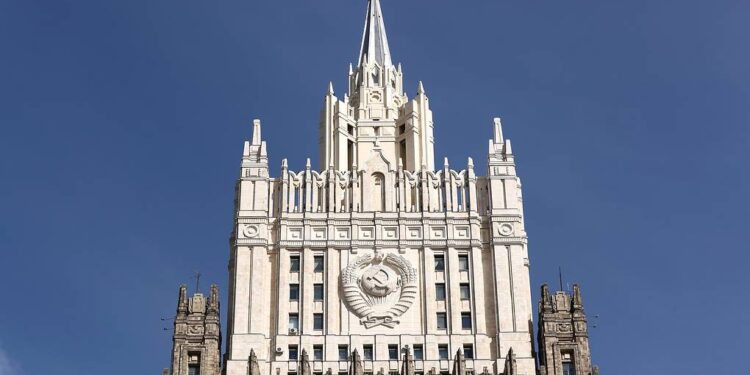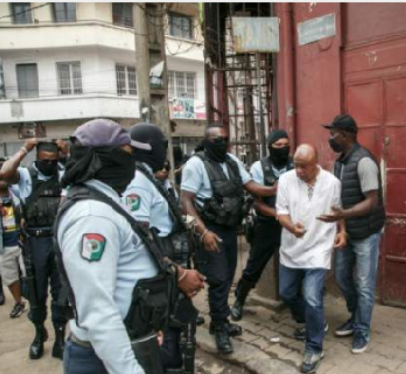News Africa
Why are Russian Companies Exiting Africa

Despite consistent assurances made by high-ranking Russian officials that Africa is “in the mainstream of Russia’s foreign policy” have not been substantiated by systematic practical activities, and worse serious lack of state support for sustaining effective Russia-African economic ties have necessitated the pulling out of a number of Russian companies from Africa.
According to various sources, Russian-African economic cooperation and partnerships continue to face challenges and obstacles, including inadequate knowledge of the Africa’s investment landscape and lack of appreciable state support, while Moscow seems to increasingly prioritise anti-Western rhetoric and political confrontation in the context of the great power competition in Africa.
Undoubtedly, a number of Russian companies have largely underperformed in Africa, experts described was primarily due to multiple reasons. Most often, Russian investors strike important investment niches that still require long-term strategies and adequate country study. Grappling with reality, there are many investment challenges including official bureaucracy in Africa.
In order to ensure business safety and consequently realize the target goals, it is necessary to attain some level of understanding the priorities of the country, investment legislations, comply with terms of agreement and a careful study of policy changes, particularly when there are sudden changes in government. It is important to study the African market structure, the investment climate, the capabilities of potential business partners and the characteristics of African customers.
Over the past few years, corporate Russian companies have shown interests in investing in the region. In practical terms, those corporate Russian companies that managed, at least, to make inroads there, a few have already exited citing “technical and operational” reasons. At the same time, the Russian corporate business leaders demonstrate negative attitude towards Africa. A general analysis shows that Russian media is under-orienting Russian business community about Africa.
While Asian states, Europe and the United States often refer to Africa as the continent of the 21st century, Russians view it from negative perspectives. Of great importance for the current successful development of the African economy is closely related to deepening of business and investment integration processes with foreign players.
Several reports confirmed that Russia has abandoned its lucrative platinum project contract that was signed for $3 billion in September 2014, the platinum mine in the sun-scorched location about 50 km northwest of Harare, the Zimbabwean capital. Reasons for the abrupt termination of the bilateral contract have still not been made public, but Zimbabwe’s Centre for Natural Resource Governance pointed to lack of capital for the project.
Foreign Minister Sergey Lavrov launched the $3 billion Russian project back in 2014, after years of negotiations, with the hope of raising its economic profile in Zimbabwe. The development of the platinum deposit in Darwendale involves a consortium consisting of the Rostekhnologii State Corporation, Vneshekonombank and Vi Holding in a joint venture with some private Zimbabwe investors as well as the Zimbabwean government.
According to Bloomberg, the Darwendale has been tied to Russia since 2006, when former Zimbabwe president, Robert Mugabe, took the concession from a local unit of South Africa’s Impala Platinum Holdings Ltd. and handed it to Russian investors. The first venture to try and tap the deposit was named Ruschrome Mining – it included a state-owned mining company, the Zimbabwe Mining Development Corp., Russian defence conglomerate Rostec, Vnesheconombank and Vi Holding.
The Darwendale project was not tendered, according to available information from government website sources monitored both in Russia and Zimbabwe. With its cordial relations, Russia was simply offered the lucrative mining concession without participating in any tender. After the project launch, Brigadier General Mike Nicholas Sango, Zimbabwe’s Ambassador to the Russian Federation, told me in an email that “Russia’s biggest economic commitment to Zimbabwe to date was its agreement in September 2014 to invest US$3 billion in what is Zimbabwe’s largest platinum mine”.
“What will set this investment apart from those that have been in Zimbabwe for decades is that the project will see the installation of a refinery to add value, thereby creating more employment and secondary industries. We are confident that this is just the start of a renewed Russian-Zimbabwean economic partnership that will blossom in coming years. Our two countries are discussing other mining deals in addition to energy, agriculture, manufacturing and industrial projects,” Ambassador Sango added.
President Emmerson Mnangagwa said his government would soon open up the platinum sector to all interested foreign investors. Zimbabwe has the world’s second-largest platinum reserves after South Africa. With the rapidly geopolitical changes, Mnangagwa has been committed to opening up Zimbabwe’s economy to the rest of the world in order to attract the much-needed foreign direct investment to revive the ailing economy and make maximum use of the opportunities for bolstering and implementing a number of large projects in the country. That Zimbabwe would undergo a “painful” reform process to achieve transformation and modernisation of the economy.
Zimbabwe has various sectors besides mining. There is a possibility of greater participation of Russian economic operators in the development processes in Zimbabwe, and southern Africa. But Russians need to move away from too much rhetoric to concrete economic engagement over the next years. Most often officials speak about Russia, claiming that Zimbabwe has had good and time-tested relations from Soviet days. Diplomatic relations between Zimbabwe and Russia already marked the 40th year and yet not a single industrial facility to boast of in that country. Zimbabwe is a member of the Southern African Development Community (SADC).
Early March, Russia’s VTB head Andrei Kostin, said in an interview with the French newspaper Les Echos, that the VTB might sell its subsidiary bank in Angola due to sanctions. According our research, VTB was one of the first to be added to the United States and European Union (EU) sanctions lists, which hit the bank’s international business hard, following the launch of the military operation in Ukraine in February last year.
“We haven’t opened any new offices in other countries during the past year. We are looking at the possibilities. It is difficult for a sanctioned bank to expand geographically, with the possible exception of Iran. Expansion is difficult even in Africa. Our branch in Angola has suffered from the sanctions, and we’ll probably have to sell it,” Kostin said.
According its information portal, VTB owns 50.1% of Banco VTB Africa. The president of the Angolan state-owned company Endiama, Antonio Carlos Sumbula, owned the other 49.9% of the bank’s shares. But, VTB currently focuses on work in Russia and in countries with which there has a large volume of foreign trade, above all China, trade with which reached $190 billion in 2022.
In December 2018, Russia’s Nornickel terminated its deal with Botswana’s BCL Group. According to TASS News Agency, quoting the media release, Russia’s Norilsk Nickel has terminated its agreement to sell African assets to Botswana’s BCL Group, including a 50% stake in the Nkomati joint venture.
It said that the Russian company would continue to seek damages from the BCL Group for the losses it suffered due to BCL’s failure to meet the terms of the agreement. The termination of the agreement would also enable Norilsk Nickel to pursue its own strategy for the African assets, Michael Marriott, Norilsk Nickel Africa’s Chief Executive, said as quoted by the press service.
“We will continue to pursue our claims against the BCL Group and the Botswana Government to recover the significant loss we have suffered as a result of their unlawful breaches,” Michael Marriott stressed.
In East African region, Russia’s RT-Global Resources and Rosneft quitted Ugandan President Yoweri Museveni’s oil refinery project and many major infrastructure deals. Russia had pledged $4 billion but later disagreements over terms and frustration over in-fighting, intrigue and lobbying forced them to pull out of the country. The Ugandan government team noted that the Russian consortium exhibited inadequate assurance and availability of preferred alternative foreign contractors with comparatively high bidding terms.
Museveni, at first, favored the Russians because, apart from considering access to weapons, the Ugandan leadership was also counting on Russia’s world superiority as a counterweight to both western powers; mainly America, and China. With Russians and the South Koreans out of the negotiations, Uganda appeared somewhat desperate, that was back in 2014.
Similarly to remind that Rosneft also abandoned its interest in the southern Africa oil pipeline construction, soon after its delegation in Angola had discussed the possible participation of the Kremlin-controlled company in exploration and development projects there. That project never appeared despite that fact that Russia has excellent relations with Angola, Mozambique, South Africa and Zimbabwe. From both business and political perspectives, the region is considered as unipolar and a regional power all together with South Africa.
In addition, Lukoil, one of the Russia’s biggest oil companies, like many Russian companies, has had a long history going forth and back with declaration of business intentions or mere interests in tapping into oil and gas resources in Africa.
Besides technical and geographical hitches, Lukoil noted explicitly in an official report on its website that “the African leadership and government policies always pose serious problems to operations in the region.” It said that the company has been ready to observe strictly all of its obligations as a foreign investor in Africa.
In August 2015, Lukoil pulled out of the oil and gas exploration and drilling project that it began in Sierra Leone. According to Interfax, the local Russian news agency, the company did not currently have any projects and has backed away due to poor exploration results in Sierra Leone.
It was reported that drilling in West Africa, including in Ghana, Côte d’Ivoire and Sierra Leone, did not bring Lukoil the expected results, as preliminary technical results did not demonstrated commercial hydrocarbon reserves. According to official reports, Vice-President Leonid Fedun did not rule out that Lukoil could withdraw from almost all of the projects in West Africa.
Over the years, Russian trade experts and business consultants have been discussing ways to improve overall economic cooperation with Africa. For instance, Andrey Efimenko, an Expert at the Russian Chamber of Commerce and Industry (CCI) told this article author in an exclusive interview that the Russian Chamber of Commerce and Trade has closely monitored the activities and performance of Russian companies in Africa.
“Unfortunately,” Efimenko regrettably pointed out, “a number of large Russian companies operating in Africa managed to establish themselves negatively in African countries. This is primarily due to ignorance of cultural peculiarities of the region, lack of social responsibility, failure to completely fulfill contractual obligations. These cases damage the image of Russia and Russian companies with further entering the African market.”
All of these developments, more or less, have degraded Russia’s image of Doing Business in Africa. In Decemebr 2018, a year prior to the first African leaders gathering in Sochi, the Valdai Discussion Club hosted an expert discussion on Africa. Oleg Barabanov, Program Director of the Valdai Discussion Club, highlighted the investment prospects and their influence there by foreign players, and further analyzed the existing perspectives and challenges for potential Russian investors.
In her contribution, Nataliya Zaiser, Chairperson of the Board of the African Business Initiative (ABI) – a Moscow based business NGO, stressed that economic cooperation with African countries is not only a Russian initiative, but also a response to request from African partners. Despite this mutual bilateral interest and potentially fruitful projects, Nataliya Zaiser said that there were still only few really successful Russian business cases on the continent.
Andrei Maslov, Coordinator of the work/project on the Russia Africa Shared Vision 2030 report, Integration Expertise Analytical Center, said that in comparison with the situation a decade ago, Africa is not only the main initiator of dialogue with Russia, but it is much more ready for it. If earlier the economic landscape of the continent was determined by Western companies with their colonial approaches, now Africa is ready to become an equal partner, according to the Valdai report.
However, there are problems: Maslov echoed Nataliya Zaiser by saying that about 90% of the projects end in failure. In order to overcome this discord, the coordinating role of the state is needed, which, together with the private business, should prepare a roadmap and set targets for the development of various industries. The driver of economic cooperation, according to Maslov, can be private rather than top-down initiatives.
“For us, Africa is not a terra incognita: the USSR actively worked there, having diplomatic relations with 35 countries. In general, there are no turns, reversals or zigzags in our policy. There is a consistent development of relations with African countries,” according to Oleg Ozerov from the Ministry of Foreign Affairs of the Russian Federation.
Signing bilateral agreements is not absolutely the best ultimate guarantee to the success of investment, however it provides legal basis. As the situation develops and interest continues to rise, Russian investors have to make part of the financial budget also for private consultancy services, as many foreign players do, and be prepared to learn more about the culture of investing in Africa.
Source: Thepressradio.com|Kestér Kenn Klomegâh





